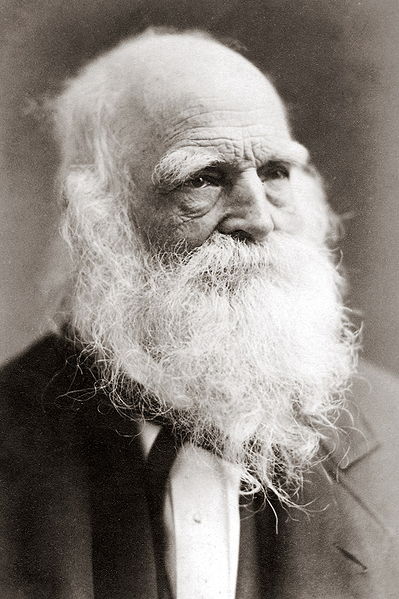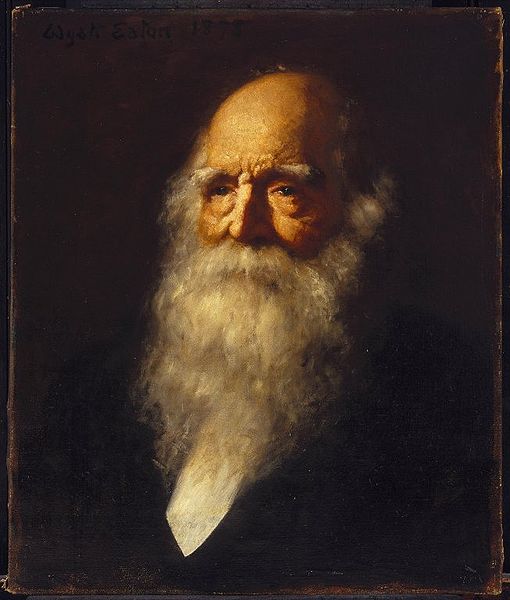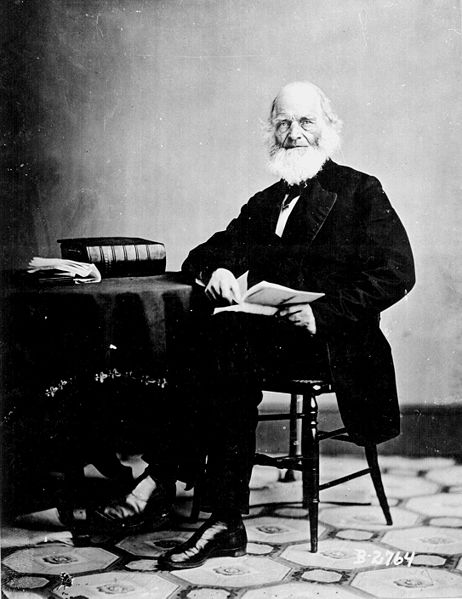<Back to Index>
- Poet and Journalist William Cullen Bryant, 1794
PAGE SPONSOR



William Cullen Bryant (November 3, 1794 - June 12, 1878) was an American romantic poet, journalist and long time editor of the New York Evening Post.
Bryant was born on November 3, 1794, in a log cabin near Cummington, Massachusetts; the home of his birth is today marked with a plaque. He was the second son of Peter Bryant (b. Aug. 12, 1767, d. Mar. 20, 1820) a doctor and later a state legislator, and Sarah Snell (b. Dec. 4, 1768 d. May 6, 1847). The genealogy of both parents trace back to passengers on the Mayflower; his mother's, to John Alden (b. 1599, d. 1687); his father's, to Francis Cooke (b. 1577, d. 1663).
Bryant and his family moved to a new home when he was two years old. The William Cullen Bryant Homestead, his boyhood home, is now a museum. After just two years at Williams College, he studied law in Worthington and Bridgewater in Massachusetts, and he was admitted to the bar in 1815. He then began practicing law in nearby Plainfield, walking the seven miles from Cummington every day. On one of these walks, in December 1815, he noticed a single bird flying on the horizon; the sight moved him enough to write "To a Waterfowl".
Bryant developed an interest in poetry early in life. Under his father's tutelage, he emulated Alexander Pope and other Neo-Classic British poets. "The Embargo", a savage attack on President Thomas Jefferson published in 1808, reflected Dr. Bryant's Federalist political views. The first edition quickly sold out — partly because of the publicity earned by the poet's young age — and a second, expanded edition, which included Bryant's translation of Classical verse, was printed. The youth wrote little poetry while preparing to enter Williams College as a sophomore, but upon leaving Williams after a single year and then beginning to read law, he regenerated his passion for poetry through encounter with the English pre-Romantics and, particularly, William Wordsworth.
Although "Thanatopsis", his most famous poem, has been
said to date from 1811, it is much more probable that
Bryant began its composition in 1813, or even later. What
is known about its publication is that his father took
some pages of verse from his son's desk and submitted
them, along with his own work, to the North American
Review in 1817. The Review was edited by
Edward Tyrrel Channing at the time and, upon receiving it,
read the poem to his assistant, who immediately exclaimed,
"That was never written on this side of the water!"
Someone at the North American joined two of the
son's discrete fragments, gave the result the Greek
derived title Thanatopsis ("meditation on death"),
mistakenly attributed it to the father, and published it.
With all the errors, it was well received, and soon Bryant
was publishing poems with some regularity, including "To a
Waterfowl" in 1821.
On January 11, 1821, Bryant, still striving to build a legal career, married Frances Fairchild. Soon after, having received an invitation to address the Harvard University Phi Beta Kappa Society at the school's August commencement, Bryant spent months working on "The Ages", a panorama in verse of the history of civilization, culminating in the establishment of the United States. That poem led a collection, entitled Poems, which he arranged to publish on the same trip to Cambridge. For that book, he added sets of lines at the beginning and end of "Thanatopsis." His career as a poet was launched. Even so, it was not until 1832, when an expanded Poems was published in the U.S. and, with the assistance of Washington Irving, in Britain, that he won recognition as America's leading poet.
His poetry has been described as being "of a thoughtful,
meditative character, and makes but slight appeal to the
mass of readers."
Writing poetry could not financially sustain a family. From 1816 to 1825, he practiced law in Great Barrington, Massachusetts, and supplemented his income with such work as service as the town's hog reeve. Distaste for pettifoggery and the sometimes absurd judgments pronounced by the courts gradually drove him to break with the legal profession.
With the help of a distinguished and well connected
literary family, the Sedgwicks, he gained a foothold in
New York City, where, in 1825, he was hired as editor,
first of the New - York Review, then of the United
States Review and Literary Gazette. But the
magazines of that day usually enjoyed only an ephemeral
life-span. After two years of fatiguing effort to breathe
life into periodicals, he became Assistant Editor of the New-York
Evening Post under William Coleman, a newspaper
founded by Alexander Hamilton that was surviving
precariously. Within two years, he was Editor - in - Chief
and a part owner. He remained the Editor - in - Chief for
half a century (1828-78). Eventually, the Evening -
Post became not only the foundation of his fortune
but also the means by which he exercised considerable
political power in his city, state and nation.
Ironically, the boy who first tasted fame for his diatribe against Thomas Jefferson and his party became one of the key supporters in the Northeast of that same party under Jackson. Bryant's views, always progressive though not quite populist, in course led him to join the Free Soilers, and when the Free Soil Party became a core of the new Republican Party in 1856, Bryant vigorously campaigned for John Frémont. That exertion enhanced his standing in party councils, and in 1860, he was one of the prime Eastern exponents of Abraham Lincoln, whom he introduced at Cooper Union. (That "Cooper Union speech" lifted Lincoln to the nomination, and then the presidency.)
Bryant edited the very successful Picturesque America
which was published between 1872 and 1874. This two volume
set was lavishly illustrated and described scenic places
in the United States and Canada.
In his last decade, Bryant shifted from writing his own poetry to a blank verse translation of Homer's works. He assiduously worked on the Iliad and The Odyssey from 1871 to 1874. He is also remembered as one of the principal authorities on homeopathy and as a hymnist for the Unitarian Church — both legacies of his father's enormous influence on him.
Bryant died in 1878 of complications from an accidental
fall suffered after participating in a Central Park
ceremony honoring Italian patriot Giuseppe Mazzini. He is
buried at Roslyn Cemetery in Roslyn, Long Island, New
York.
Poet and literary critic Thomas Holley Chivers said that the "only thing [Bryant] ever wrote that may be called Poetry is 'Thanatopsis', which he stole line for line from the Spanish. The fact is, that he never did anything but steal — as nothing he ever wrote is original." Contemporary critic Edgar Allan Poe, on the other hand, praised Bryant and specifically the poem "June" in his essay "The Poetic Principle":
The rhythmical flow, here, is even voluptuous — nothing could be more melodious. The intense melancholy which seems to well up, perforce, to the surface of all the poet's cheerful sayings about his grave, we find thrilling us to the soul — while there is the truest poetic elevation in the thrill... the impression left is one of a pleasurable sadness.
Editor and children's writer Mary Mapes Dodge wrote that Bryant's poems "have wrought vast and far reaching good in the world." She predicted, "You will admire more and more, as you grow older, the noble poems of this great and good man."
Bryant's poetry is tender and graceful, pervaded by a
contemplative melancholy, and a love of solitude and the
silence of the woods. Though he was brought up to admire
Pope, and in his early youth imitated him, he was one of
the first American poets to throw off his influence. He
had a high sense of duty, was a prominent and patriotic
citizen, and enjoyed the esteem and even the reverence of
his fellow countrymen.
In 1884, New York City's Reservoir Square, at the intersection of 42nd Street and Sixth Avenue, was renamed Bryant Park in his honor. The city later named a public high school in Long Island City, Queens in his honor.
Although he is now thought of as a New Englander, Bryant, for most of his lifetime, was thoroughly a New Yorker — and a very dedicated one at that. He was a major force behind the idea that became Central Park, as well as a leading proponent of creating the Metropolitan Museum of Art. He was one of a group of founders of New York Medical College. He had close affinities with the Hudson River School of art and was an intimate friend of Thomas Cole. He defended immigrants and, at some financial risk to himself, championed the rights of workers to form labor unions.
As a writer, Bryant was an early advocate of American literary nationalism, and his own poetry focusing on nature as a metaphor for truth established a central pattern in the American literary tradition.
Martin Luther King, Jr quoted Bryant in his speech "Give Us the Ballot", when he says: There is something in this universe which justifies William Cullen Bryant in saying: “Truth crushed to earth will rise again.”